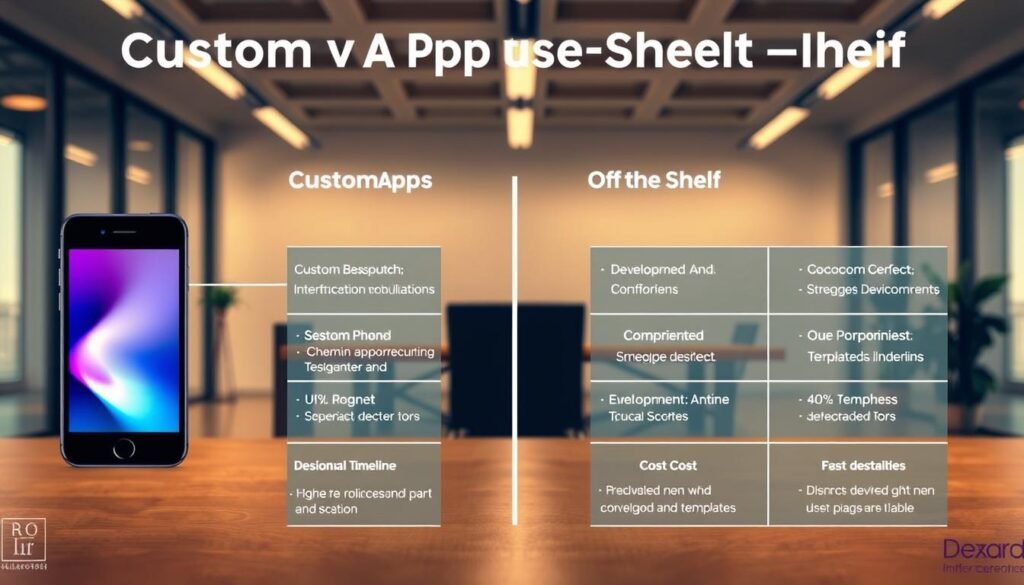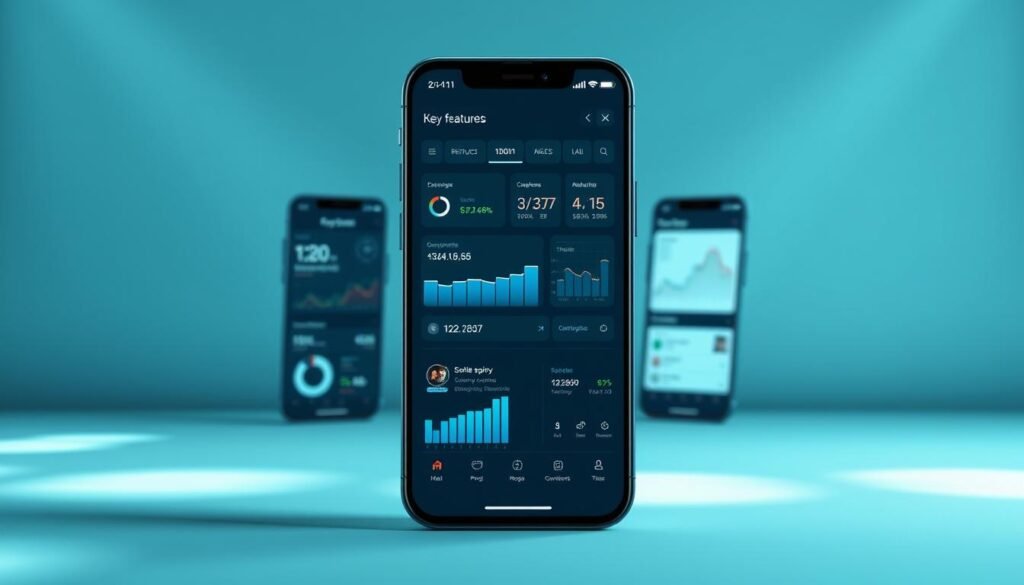In today’s digital world, having a customized business solution is essential, not just a luxury. We look at why every business needs a tailored approach in 2025. We also highlight the benefits and trends that are driving this need.
We explore the world of innovative app development and what makes a business solution successful. We see how it can change your business operations. For more information or to ask questions, please contact us at info@consac.dev.
The Rise of Mobile App Development in Business

Mobile apps are changing how businesses work, connect with customers, and compete in the market. Having a strong mobile presence is key in today’s digital world. Companies are turning to mobile app development to stay ahead and meet customer needs.
Trends Driving Mobile App Adoption
Several trends are pushing businesses to use mobile apps. These include:
- Increased Mobile Usage: More people are using smartphones, so businesses are making apps to reach them better.
- Enhanced Customer Experience: Mobile apps offer a personal touch, boosting customer loyalty and engagement.
- Operational Efficiency: Apps can make business processes smoother, saving time and money.
- Data-Driven Insights: Mobile apps give valuable data on customer behavior, helping businesses make smart choices.
The Shift to Digital: How Businesses Are Adapting
Businesses are changing by investing in mobile app development. This change involves:
- Embracing Digital Transformation: Companies use mobile apps to improve their digital strategy and overall business plan.
- Innovating Customer Engagement: Mobile apps let businesses create more interactive and personal customer experiences.
- Staying Competitive: By using mobile app development, businesses can keep up with the competition and meet market needs better.
By understanding these trends and adapting to the digital shift, businesses can use mobile apps to grow and succeed.
Key Benefits of Business Apps

Business apps are changing how companies talk to customers, make things run smoother, and keep customers coming back. They use mobile tech to make experiences more personal and fun. This leads to happier customers who stick around.
Enhancing Customer Engagement
Business apps are great at getting customers involved. They send messages, share special deals, and make content just for them. For example, a store can send special deals to its best customers, making them want to buy more.
Apps also let customers talk directly to the brand. They can give feedback, get help, and share their own stories. This makes customers happier and more loyal.
Key features that enhance customer engagement include:
- Personalized content and offers
- Push notifications for timely updates
- In-app messaging for direct communication
- Feedback forms for customer insights
Streamlining Operations
Business apps also help make things run better. They automate tasks and give up-to-the-minute info. For example, a delivery company can track packages, plan routes, and manage drivers better.
Apps also help with team work. They let teams work together, assign tasks, and track progress. This makes teams work better and get things done faster.
The benefits of streamlining operations with business apps include:
- Increased efficiency through automation
- Real-time data for informed decision-making
- Improved team collaboration and productivity
Improving Brand Loyalty
Lastly, business apps help build brand loyalty. They offer a smooth and fun experience, creating a strong brand image. For example, a coffee shop can reward customers for coming back, making them more loyal.
Apps also help keep brands in customers’ minds. With regular updates, special deals, and content just for them, customers stay loyal and engaged.
Strategies for improving brand loyalty with business apps:
- Implement loyalty programs
- Offer exclusive content and offers
- Use personalized marketing
Choosing the Right App Development Services
The success of your business app depends on the app development services you choose. In today’s market, a well-made app can change the game for businesses. It can improve customer engagement and make operations smoother.
Assessing Your Business Needs
Before starting app development, understand your business needs. Know your target audience and what your app’s purpose is. Also, figure out the features that will keep users interested. This will help you plan your app development project.
Take time to think about your business goals and how a mobile app can help. Ask yourself:
- What are the main functions of your app?
- Who do you want to reach with your app?
- What makes your app stand out from others?
Comparing Different Service Providers
After knowing your business needs, compare professional app developers. Look at their portfolio, expertise, and what past clients say. This ensures they fit your project needs.
When looking at service providers, consider these points:
- Expertise: Find developers with experience in your app’s area.
- Portfolio: Check their past work to see if it’s up to par.
- Client Testimonials: What others say can tell you a lot about their reliability.
By carefully looking at your needs and comparing services, you can choose the best app development services for your project.
Types of Business Apps You Can Develop

The world of app design and development offers many solutions for different business needs. As businesses move online, knowing the types of apps available is key. This helps make smart choices.
E-Commerce Apps
E-commerce apps make online shopping easy for customers. They can be tailored with features like:
- Personalized product recommendations
- Secure payment gateways
- Order tracking and management
With custom app development, businesses can create unique e-commerce apps. This boosts customer engagement and sales.
Service-Oriented Apps
Service-oriented apps help businesses that sell services, not products. They manage appointments, client interactions, and service delivery. Key features include:
- Appointment scheduling
- Client communication tools
- Service tracking and analytics
Through app design and development, service businesses can run smoother. This leads to happier customers.
Internal Management Apps
Internal management apps improve internal processes and productivity. They can be used for:
- Employee management
- Project management
- Inventory tracking
By using custom app development, companies can create apps for their specific needs. This boosts efficiency and cuts costs.
In conclusion, the right app for your business depends on your goals and needs. Whether it’s for e-commerce, services, or internal management, app design and development are vital for success.
Custom vs. Off-the-Shelf Apps

Choosing between custom app development and off-the-shelf solutions is a big decision. It depends on several important factors. We’ll look at scalability, flexibility, and cost to help you decide what’s best for your business.
When to Choose Custom Development
Custom app development lets businesses create apps that fit their exact needs. It’s great for businesses with unique processes or requirements that standard apps can’t meet.
Custom development has several benefits:
- It’s very flexible, adapting to changing business needs
- It scales well to grow with your business
- It integrates well with your existing systems and processes
For example, a company with a complex supply chain might need a custom app. This app can integrate with their systems, providing real-time updates and making operations smoother.
Advantages of Off-the-Shelf Solutions
Off-the-shelf solutions are quicker and often cheaper to implement. They’re pre-built and ready to use right away. Many providers offer customization options to fit your business needs.
The main benefits of off-the-shelf solutions are:
- They cost less upfront than custom development
- They deploy faster, getting you to market quicker
- They often come with ongoing support and updates
For instance, a small business wanting an online presence might choose an off-the-shelf e-commerce app. It’s a cost-effective and efficient way to start.
| Factor | Custom Development | Off-the-Shelf Solutions |
|---|---|---|
| Cost | Higher upfront costs | Lower upfront costs |
| Scalability | Highly scalable | Limited scalability |
| Flexibility | Highly flexible | Moderately flexible |
| Integration | Easier integration with existing systems | May require additional integration efforts |
The choice between custom and off-the-shelf apps depends on your business’s specific needs and goals. By considering cost, scalability, and flexibility, you can make a decision that supports your business objectives.
Key Features to Include in Business Apps

To make a business app that users will love, you need to include key features. These features should make the app engaging, secure, and easy to use with other systems.
User-Friendly Interface
A good app needs a user-friendly interface. It should be easy to use and understand. A well-designed app makes users happy and increases its use.
Here’s what makes an interface user-friendly:
- Simple and consistent navigation
- Clear and concise content
- Responsive design for various devices
Security Considerations
Security is very important in business apps. You need strong security to keep user data safe. This includes using encryption and secure login methods.
Important security steps are:
- Data encryption
- Secure authentication and authorization
- Regular security audits and updates
Integration with Existing Systems
Business apps should work well with other systems. This means they should connect with CRM and ERP systems. This makes work easier and more efficient.
Benefits of integration are:
- Streamlined business processes
- Improved data accuracy and consistency
- Enhanced productivity through automation
| Feature | Description | Benefits |
|---|---|---|
| User-Friendly Interface | Intuitive design for easy navigation | Enhanced user experience, higher adoption rates |
| Security Measures | Robust security protocols | Protected user data, prevented unauthorized access |
| System Integration | Seamless integration with existing systems | Streamlined processes, improved data consistency |
The Cost of Mobile App Development

The cost of making a mobile app can change a lot. This depends on several important things that businesses need to think about. It’s key to know what affects these costs and how to plan your budget for your app project.
Factors Influencing Development Costs
Several things can change how much it costs to make a mobile app. These include:
- Complexity of the App: Apps with lots of features, like real-time data and advanced security, cost more.
- Technology Used: The tech stack you choose, like native or cross-platform, affects the price. Native apps might be pricier because they need specific skills for each platform.
- Expertise of the Development Team: The team’s experience and where they are can also change the cost. Teams with special skills or in places with higher labor costs will charge more.
Budgeting for App Development
To plan your budget for your app project, follow these steps:
- Define Your Requirements: Clearly list what features and tech your app needs. This helps get accurate quotes from developers.
- Get Multiple Quotes: Look at several app development services to compare prices and what they offer.
- Prioritize Features: Start with a basic version of your app (MVP) first. This lets you test it with less money before adding more features.
- Plan for Maintenance: Remember, app development isn’t just a one-time thing. You’ll need to keep updating and maintaining your app to keep it safe and working well.
Understanding what affects costs and planning well can help businesses make smart choices for their app projects. Whether it’s a simple app or a big enterprise solution, working with a good app development company can help keep your project on track and within budget.
The Development Process Explained

To create a business app, developers follow a detailed process. This process ensures the app is top-notch and meets user needs. We’ll look at each stage, focusing on what makes an app successful.
From Ideation to Launch
The app development starts with ideation. Here, we define the app’s purpose, audience, and main features. This stage is key for setting the project’s direction.
Next, we enter the design phase. We create wireframes and prototypes to show the app’s layout and interface. This step is vital for a smooth user experience. Our designers work with stakeholders to improve the design based on feedback.
Then, the development stage begins. Our team writes code, integrates APIs, and tests the app thoroughly. We focus on testing to catch and fix bugs early.
After development, we launch the app in the app stores. We make sure it meets store guidelines and is easy to find. We also plan marketing before and after launch to get people excited about the app.
Role of Agile Methodology
Agile methodology is key in app development. It helps us adapt to changes and deliver the app in stages. This approach promotes teamwork and keeps everyone on the same page.
Agile lets us quickly respond to feedback and make changes easily. This is important in today’s fast business world. Using Agile ensures the app is relevant and effective.
“Agile methodology has revolutionized the way we develop software, allowing us to be more responsive to customer needs and deliver high-quality products faster.”
Agile’s main benefits are:
- Enhanced collaboration and communication
- Faster time-to-market
- Greater flexibility in responding to change
- Improved quality through continuous testing
| Development Stage | Key Activities | Deliverables |
|---|---|---|
| Ideation | Market research, defining app purpose | App concept document |
| Design | Wireframing, prototyping | Design specifications |
| Development | Coding, API integration, testing | Functional app build |
| Launch | App store deployment, marketing | Launched app |
Marketing Your Business App Effectively

Marketing is key to your app’s success. We’ll look at ways to promote your app and make it popular. We’ll use digital marketing to get more people to use and enjoy your app.
Building Pre-Launch Buzz
Getting people excited before your app launches is important. We start by creating a buzz with teaser campaigns on social media, email, and influencer partnerships. This early buzz can lead to more downloads and loyal users.
We tell a compelling story about our app creation. We highlight what makes our app special and different from others.
Utilizing Social Media Platforms
Social media is great for promoting your app. We use Facebook, Twitter, and Instagram to reach our audience. We share interesting content and direct people to our app’s page.
We create a social media strategy that fits our marketing goals. This helps us get more people to know about our brand, get leads, and engage with our app. We share insights into our app design and development and user feedback.
To reach more people, we use paid social media ads. We target specific groups to make sure our message hits home with them.
Maintaining and Updating Your App
To keep your business app thriving, it’s key to focus on maintenance and updates. This keeps up with your users’ changing needs. Regular upkeep makes sure the app works well and is safe. It also makes the app better for users, leading to long-term success.
Importance of Regular Updates
Regular updates are key for fixing bugs, boosting performance, and adding new features. This keeps your app current and competitive. It also helps keep users happy and loyal, leading to good word-of-mouth.
Key benefits of regular updates include:
- Enhanced security through patches and updates
- Improved user experience through bug fixes and performance enhancements
- New features that keep the app fresh and competitive
Strategies for User Feedback
Getting and using user feedback is a must for a successful app. By listening to users, we find out what needs fixing or improving. We then focus on updates that users really want.
Effective strategies for gathering user feedback include:
- In-app surveys and feedback forms
- Analytics tools to track user behavior and identify pain points
- Social media and app store monitoring to capture user sentiments
By using these methods, we make sure our app grows with what users need. This boosts engagement and loyalty.
Future Trends in Mobile App Development
The world of mobile app development is changing fast. New trends are emerging that will shape the industry soon. Businesses are using mobile apps more to connect with customers and make things easier.
AI and machine learning are big players in the future of apps. They make apps smarter and more personal. This means users get a better experience.
The Role of AI and Machine Learning
AI and machine learning are changing custom app development. They make apps that learn and adapt to how users act. This makes apps more fun and easy to use.
AI and machine learning also boost app security. They spot and stop fraud, keeping user data safe. So, companies are turning to app development services that use these techs to stay competitive.
The Rise of Voice-Activated Apps
Voice-activated apps are becoming more common. With the help of Siri, Google Assistant, and Alexa, talking to apps is getting popular. This lets users control apps without their hands.
This trend is great for businesses wanting to make things easier for users. By adding voice tech, apps become more user-friendly. As voice tech gets better, we’ll see even more cool voice apps.
In short, the future of mobile apps is bright and full of new ideas. With AI, machine learning, and voice tech, businesses can make apps that really meet user needs. By using these trends and working with skilled app development services, companies can lead the way in the mobile world.
Conclusion: Embracing the App Revolution
Looking ahead to 2025, mobile app development is key for businesses. We’ve seen how apps drive innovation, engagement, and growth. By using mobile apps, companies can lead and succeed in the digital world.
Preparing for a Mobile-First Future
Get ready for the future by working with a top app development company. They can help you make a custom app. This boosts customer interaction, makes operations smoother, and strengthens your brand.
Staying Ahead of the Curve
Mobile app development keeps getting better, with new trends and tech coming up. Stay updated and adapt to these changes to stay ahead. For more on mobile app development, reach out to us at info@consac.dev.

